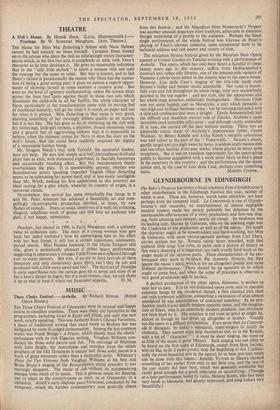THEATRE
A Doll's House. By Henrik Ibsen. (Lyric, Hammersmith.) Penelope. By W. Somerset Maugham. (Arts Theatre.) THE blame for Miss Mai Zetterling's failure with Nora Helmer cannot be laid entirely on Ibsen himself. Certainly Ibsen foisted on to the actress who plays the doll an infuriatingly wordy characteri- sation which, in the first two acts, is completely at odds with Nora's character as he later develops it. He gives no reasonable indication that in the "silly little skylark" is latent a woman with not only the courage but the sense to rebel. But that is known, and in fact Ibsen's failure is paradoxically the reason why Nora has-the reputa- tion of being a great acting part: it gives an actress a superb oppor- tunity of showing herself in some measure a creative artist. But even on the level of ordinary craftsmanship, unless the actress plays across the lines (not quite against them) in those two acts which illuminate the child-wife in all her futility, the whole character of Nora, particularly in the transformation scene with its moving feel of emotional maturity, will go for what it is worth on paper and not for what it is played. Miss Zetterling in that scene is very good, showing something of her movingly sincere quality as an actress, but it is too late. She has gone so far in cluttering up the doll with fey twitterings, little-girl coyness, a plaintive, forced monotone voice and a general feel of aggravating silliness that it is impossible to believe, when the moment comes for Nora to slam the door on the doll's house, that she could have suddenly acquired the dignity of a reasonable human being.
Mr. Mogens Wieth's way with Torvald, the successful banker, does not help. He sees him simply as a naïf, platitudinous droll and plays him as such, with mannered expertness, to flaccidly humorous and occasionally touching effect. But this interpretation finally overbalances the play. It is questionable, anyway, whether two Scandinavian actors speaking imperfect English (Miss Zetterling seems to be cultivating her accent hard, anti is less easily intelligible than Mr. Wieth, making his first appearance in this country) are ideal casting for a play which, whatever its country of origin, is a universal classic.
Nevertheless, this revival has some remarkably fine things in it and Mr. Peter Ashmore has achieved a beautifully set and corn- pellingly claustrophobic production sparked, at times, by rare flashes of comedy. Ibsen, as usual, comes out of it well; his irritating, illogical, rebellious work of genius can still beat an audience into glad, if not happy, submission.
• Penelope, last played in 1909, is Early Maugham with a curiosity value to collectors only. The story of a young woman who gets back her jaded husband's love by encouraging him in his affair with her best friend, it still has a certain repetitious, adolescent, period charm. Miss Pauline Jameson, in the Marie Tempest title role, gives a pedantically pleasant if rather heavy performance, suggesting in appearance a younger Edith Evans seen reflected through ever so many mirrors. But why, if we are to have revivals of these immature and only moderately good plays, can't they be cut and produced with a little more speed and bite? The third act of Penelope is quite superfluous now the curtain goes up at seven and none of us has a heavy dinner to digest, but if it must remain, slice, ice and shako it up so that at least it whets our frustrated appetite. D. M.


































 Previous page
Previous page